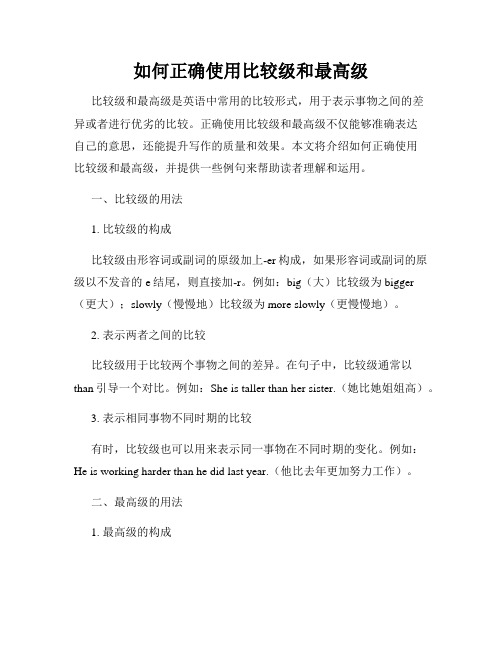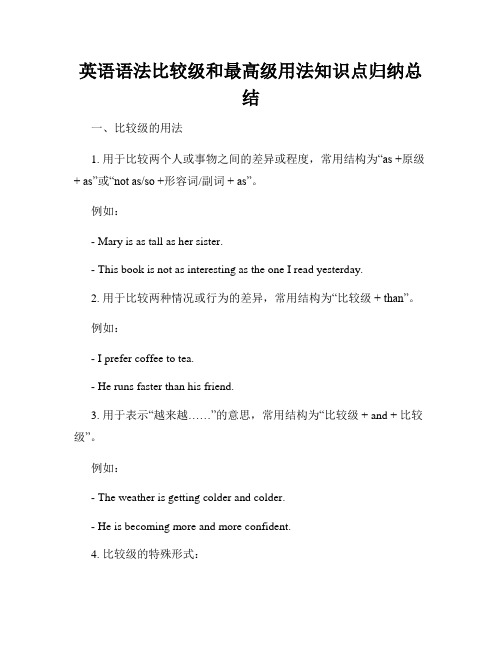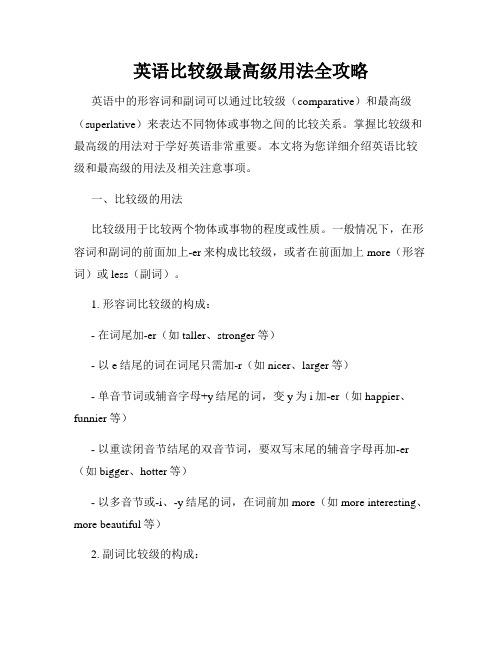英语比较级和最高级的用法
如何正确使用比较级和最高级

如何正确使用比较级和最高级比较级和最高级是英语中常用的比较形式,用于表示事物之间的差异或者进行优劣的比较。
正确使用比较级和最高级不仅能够准确表达自己的意思,还能提升写作的质量和效果。
本文将介绍如何正确使用比较级和最高级,并提供一些例句来帮助读者理解和运用。
一、比较级的用法1. 比较级的构成比较级由形容词或副词的原级加上-er构成,如果形容词或副词的原级以不发音的e结尾,则直接加-r。
例如:big(大)比较级为bigger(更大);slowly(慢慢地)比较级为more slowly(更慢慢地)。
2. 表示两者之间的比较比较级用于比较两个事物之间的差异。
在句子中,比较级通常以than引导一个对比。
例如:She is taller than her sister.(她比她姐姐高)。
3. 表示相同事物不同时期的比较有时,比较级也可以用来表示同一事物在不同时期的变化。
例如:He is working harder than he did last year.(他比去年更加努力工作)。
二、最高级的用法1. 最高级的构成最高级由形容词或副词的原级前面加上the以及后缀-est构成。
如果形容词或副词的原级以不发音的e结尾,则直接加-est。
另外,有些形容词和副词的最高级形式是不规则的,需要特别记忆。
例如:good (好)最高级为best(最好);bad(坏)最高级为worst(最坏)。
2. 表示三者或三者以上的比较最高级用于比较三个或三个以上事物之间的优劣。
在句子中,最高级通常以of引导一个对比。
例如:He is the tallest of all the students.(他是所有学生中最高的)。
3. 表示同一事物不同时期的比较最高级也可用来表示同一事物在不同时期的变化。
例如:This is the best movie I have ever seen.(这是我看过的最好的电影)。
三、注意事项1. 形容词和副词的变化有些形容词和副词的比较级和最高级形式是不规则的,需要特别记忆。
比较级和最高级的用法

比较级和最高级的用法比较级和最高级是英语中两种重要的形容词、副词变化形式。
它们是用来表示物品、人或者概念等在质量、数量、程度等方面的大小关系的。
掌握比较级和最高级有助于英语学习者在表达中更准确、自然地表达自己的意思。
一、比较级的用法一、表示两个人或者物之间的大小关系比较级用来表示两者之中一个具有更强烈的特点或者更多的特点。
通常来说,比较级由“+er”或者由“more+形容词或者副词原形”。
1. +er的比较级形式+er的形式是唯一的,适用于单音节、双音节以及一些多音节词的形容词和副词。
例如:- I am taller than my sister.- This dress is cheaper than that.- She runs faster than him.2. more+形容词/副词原形more的形式应用于多音节的形容词和副词,它是无限制的形式。
例如:- This book is more interesting than the one I read last week.- She speaks more confidently than her friends.- The boy is more mature than others in his class.二、使用比较级进行比较1. 更多 than使用比较级的一个重要方面是来比较两个人或事物之间的差异。
通常使用“更多than”的形式来进行比较,如:- My sister has more friends than I do.- He exercises more frequently than I do.- She has more experience than I do in this field.2. 不如 than另一方面,比较级也可以使用“不如than”的形式来表示一个人或者物不如另一个人或物,如:- She is not as tall as her brother.- This restaurant is not as crowded as the other one.- Tom is not as smart as his friends.3. The -er, the -er可以通过使用“the + comparative形式 + the comparative形式”的结构来表示相应的效果随特定条件的增加/减少而增加/减少,例如:- The harder you study, the better your grades will be.- The more you practice, the better you will become.- The more you eat, the fatter you will get.4. nearly/hardly/barely/moderately等程度副词比较级还可以与程度副词一起使用,表示一定的程度。
最高级和比较级的用法

最高级和比较级的用法比较级的用法:1.双方比较表示一方超过另一方时, 用“比较级+than”的结构表示.例如:There are more workers in this factory than in that factory.这个工厂的工人比那个工厂的多.The climate of Dalian is better than that of Shanghai.大连的气候比上海好.The atmosphere of the earth is much denser than that of the moon. 地球的大气比月球的要稠密的多.2.表示一方不及另一方时,用“less +原级+ than”的结构表示.例如:This room is less beautiful than that one.这个房间不如那个房间漂亮.They speak less fluently but more correctly than we(do).他们讲得不如我们流利,但比我们准确.5.表示一方超过另一方的程度或为二倍时,可在比较级前加表示程度的状语.如: even, a little ,still, much, far , yet ,by far, slightly, very much, no, any, rather, a great deal, a lot, lots, a bit等修饰.例如:He works even harder than before.他比以前更加努力工作.There is lots more sugar in the storeroom.储藏室有更多的糖.He was too tired to walk any further.他太累了,再也走不动了.Are you any better than before?你今天比以前好点了吗?That would be a great deal better.那样的话就好多了.The photographs of Mars taken by satellites are much clearer than those taken from the earth.从卫星上拍的照片比从地球上拍的清楚.注意:英语的比较级前如无even, still或yet等时,译成汉语时可用“较……”或“……一些”或不译出,一般不可用“更”.如:She is better than she was yesterday.她比昨天好些了.Please come earlier tomorrow.明天请早点来.注意:by far, far, much 通常用于强调最高级.by far用于比较级时,一般放在比较级的后面.如放在前面,应在二者中间加“the”.far and away, out and away, the very只能用于修饰最高级.如:Building this tunnel was by far the most challenging problem in the system.建筑这样一条隧道无疑是这个系统中最棘手的工程.This is much the best.这是最好的.It is far and away ( or out and away) the best.这是好的无以复加.This is the very best book that he ever wrote.这是他写过的书中最好的一本.8.表示主语随另一方的程度而变化时,用“the +比较级(主语+谓语), the +比较级(主语+谓语)”的结构.例如:The harder he works, the happier he feels.他越努力工作越感到幸福.The higher we went up the mountain, the colder it became. 越往山的高处爬越冷.The more they talked, the more encouraged they felt.他们越说越感到鼓舞.12.不与其它事物相比,表示本身程度的改变时, 用“比较级+比较级”的结构.例如:The weather is getting colder and colder.天气越来越冷.The girl becomes more and more beautiful.这个女孩长得越来越漂亮.The days become longer and longer.天变的越来越长.We are walking more and more slowly.我们走得越来越慢.6. 在inferior(劣于), superior(优于), junior(年幼的), senior(年长的), prior(前面的), posterior(后面的)等后面用to代替than.例如:He is superior to Mr. Wang in mathematics.在数学上他比王先生好.His work is inferior to mine.他的工作不如我的好.He is 2 years senior to me.他比我大两岁.The duty is prior to all others.这项任务比其他任务都重要.7.在比较从句中为了避免重复,我们通常用that (those),one (ones)代替前面出现的名词,that指物,one既可指人,也可指物.that可代替可数名词单数和不可数名词,而one只能代替可数名词.例如:The book on the table is more interesting than that on the desk.餐桌上的那本书比课桌上的那本书有趣.A box made of iron is stronger than one made of wood .铁箱子比木箱子结实.“ the + 形容词的比较级+ of ”例如:He is the taller of the two.他是两个人中较高的一个.She is the more beautiful of the two sisters.她是两姐妹中较美的一个.Of the two landscapes that you have shown me, this one is the more picturesque.你给我看的两处景色中,这一处更别致.8.表示倍数的比较级有如下几种句型:A. A is three (four,etc.)times the size (height,length,width,etc.)of B例如:The new building is four times the size(the height)of the old one.这座新楼是那座旧楼的四倍大(四倍高).(这座新楼比那座旧楼大三倍[高三倍])B. A is three (four, etc.)times as big (high, long, wide, etc.)as B.例如:Asia is four times as large as Europe亚洲是欧洲的四倍大.(亚洲比欧洲大三倍.)C. A is three(four, etc.)times bigger(higher, longer, wider, etc.)than B例如:Your school is three times bigger than ours.你们的学校比我们的学校大三倍.(你们的学校是我们学校的四倍大.)用times表示倍数,一般限于表示包括基数在内三倍或三倍以上的数.表示两倍可以用twice或double.四、最高级的用法1. 三者或三者以上相比,2. 表示最高程度时,3. 用“the + 最高级”的结构表示.这种句式一般常有表示比较范围的介词短语.例如:Zhang Hui is the tallest of the three.张辉是三个人中最高的.He works (the) hardest in his class.他是班级中最用功的学生.2. 最高级可被序数词以及much, by far, nearly, almost, by no means, not quite, not really, nothing like等词语所修饰.例如:This hat is by far/much/ nearly/ almost/not nearly/ by no means/ not quite/nothing like the biggest.这个帽子是最大的.How much is the most expensive computer ?那个价格最昂贵的计算机需要多少钱?3. 表示“最高程度”的形容词,如excellent, extreme, perfect等,没有最高级,也不能用比较级.4. 形容词最高级修饰作表语或介词宾语的名词、代词时被修饰的词往往省略.例如:He is the tallest (boy) in his class.他是班级中最高的男孩.5. 作状语的副词最高级前可以不加定冠词.例如:Of all the boys he came (the) earliest.在所有的男生中他来得最早.。
比较级与最高级的用法与形式

比较级与最高级的用法与形式比较级和最高级是英语中用来比较两个或多个事物的形式。
它们主要用来表达事物之间的差异或者程度上的优劣。
在本文中,我们将详细探讨比较级和最高级的用法和形式。
一、比较级的用法和形式1. 形容词比较级的用法:形容词比较级用来比较两个事物的差异或程度上的优劣。
比较级的基本形式为:原形 + er。
例如:tall(高)- taller(更高)。
2. 副词比较级的用法:副词比较级同样用来比较两个事物的差异或程度上的优劣。
比较级的基本形式为:原形 + er。
例如:quickly(快速地)- more quickly (更快)。
3. 比较级的用法:比较级在句子中通常需要与than(比)一起使用,以表达两个事物之间的比较。
例如:She is taller than her sister.(她比她妹妹高)。
4. 比较级的修饰语:比较级可以添加修饰语来增强比较的程度。
常见的修饰语有much (更多)、far(更远)、a little(有点)等。
例如:He is much taller than me.(他比我高得多)。
5. 特殊情况:对于以辅音字母+y结尾的形容词和副词,将y变为i再加上er。
例如:happy(快乐)- happier(更快乐)。
二、最高级的用法和形式1. 最高级的用法:最高级用来比较三个或三个以上的事物,以表达其中一项在程度上的优势。
最高级通常与in(在……中)一起使用。
例如:He is the tallest student in the class.(他是班上最高的学生)。
2. 最高级的形式:最高级的基本形式为:the + 形容词或副词的最高级形式。
形容词和副词最高级的构成方式与比较级类似,通常在原形的基础上加上est。
例如:tall(高)- the tallest(最高)。
3. 最高级的修饰语:最高级也可以添加修饰语来增强程度。
同比较级一样,常见的修饰语有much(更多)、far(更远)、by far(最远)等。
英语语法比较级和最高级用法知识点归纳总结

英语语法比较级和最高级用法知识点归纳总结一、比较级的用法1. 用于比较两个人或事物之间的差异或程度,常用结构为“as +原级+ as”或“not as/so +形容词/副词+ as”。
例如:- Mary is as tall as her sister.- This book is not as interesting as the one I read yesterday.2. 用于比较两种情况或行为的差异,常用结构为“比较级+ than”。
例如:- I prefer coffee to tea.- He runs faster than his friend.3. 用于表示“越来越……”的意思,常用结构为“比较级 + and + 比较级”。
例如:- The weather is getting colder and colder.- He is becoming more and more confident.4. 比较级的特殊形式:- 以字母e结尾的形容词,去掉e再加-er。
- 以重读闭音节结尾的单音节形容词和部分双音节形容词,直接加-er。
- 以“辅音字母+y”结尾的形容词,把y变成i再加-er。
例如:- nice → nicer- big → bigger- happy → happier二、最高级的用法1. 用于三个或三个以上人或事物之间的比较,表示最高程度,常用结构为“the + 最高级”。
例如:- She is the tallest girl in the class.- This is the most interesting book I've ever read.2. 最高级的特殊形式:- 以字母e结尾的形容词,去掉e再加-st。
- 以重读闭音节结尾的单音节形容词和部分双音节形容词,直接加-st。
- 以“辅音字母+y”结尾的形容词,把y变成i再加-est。
例如:- nice → nicest- big → biggest- happy → happiest三、比较级和最高级的不规则形式1. 比较级和最高级的不规则形式:good → better → best, bad → worse → worst, many/much → more → most, little → less→ least。
英语比较级最高级用法全攻略

英语比较级最高级用法全攻略英语中的形容词和副词可以通过比较级(comparative)和最高级(superlative)来表达不同物体或事物之间的比较关系。
掌握比较级和最高级的用法对于学好英语非常重要。
本文将为您详细介绍英语比较级和最高级的用法及相关注意事项。
一、比较级的用法比较级用于比较两个物体或事物的程度或性质。
一般情况下,在形容词和副词的前面加上-er来构成比较级,或者在前面加上more(形容词)或less(副词)。
1. 形容词比较级的构成:- 在词尾加-er(如taller、stronger等)- 以e结尾的词在词尾只需加-r(如nicer、larger等)- 单音节词或辅音字母+y结尾的词,变y为i加-er(如happier、funnier等)- 以重读闭音节结尾的双音节词,要双写末尾的辅音字母再加-er (如bigger、hotter等)- 以多音节或-i、-y结尾的词,在词前加more(如more interesting、more beautiful等)2. 副词比较级的构成:- 在词尾加-er(如faster、sooner等)- 以e结尾的词只需加-r(如nicer、later等)- 辅音字母+y结尾的词,变y为i加-er(如easily、happily等)- 以多音节或ly结尾的词,在词前加more(如more carefully、more quickly等)例句:1. Peter is taller than John.(比较级)2. She is more beautiful than her sister.(比较级)3. Tom runs faster than his brother.(比较级)二、最高级的用法最高级用于描述三个或三个以上的物体或事物之间的比较关系,表示最高程度或性质。
一般情况下,在形容词或副词前加上-the前缀,或者使用most(形容词)或least(副词)。
归纳英语比较级和最高级的用法
归纳英语比较级和最高级的用法英语比较级和最高级是用来表示不同对象之间的比较关系的语法形式。
比较级用于比较两个对象,而最高级则表示一个对象在同一类中是最高的。
以下是关于英语比较级和最高级的用法的总结:比较级的用法1. 比较级通常用于比较两个对象的某个特征或性质。
常用的比较级形式是在形容词后面加上"-er",或在词前加上"more"。
- Tom is taller than John. (汤姆比约翰高。
)- This book is more interesting than the previous one. (这本书比之前那本更有趣。
)2. 当比较级用于表示两个对象之间的差异时,常用的结构是"比较级 + than"。
- She is more patient than her sister. (她比她姐姐更有耐心。
)- The second movie is better than the first one. (第二部电影比第一部好。
)3. 比较级也可以用来表示变化或增减的程度。
- Prices are getting higher and higher. (价格越来越高。
)最高级的用法1. 最高级用于表示某一类中的一个对象在某个特征上是最高的。
通常在形容词前加上"the",再加上"-est",或在词前加上"the most"。
- He is the tallest boy in the class. (他是班级里最高的男孩。
)- This is the most challenging task I have ever encountered. (这是我遇到过最具挑战性的任务。
)2. 最高级也可以用于表示程度或范围。
- They are the most successful band in the world. (他们是世界上最成功的乐队。
比较级最高级的用法
比较级最高级的用法比较级和最高级是英语中常见的语法形式,用于比较两个或多个事物的程度或大小。
它们的用法可以分为以下几种:一、比较级和最高级的用法1. 比较两个人或事物的程度或大小(某个属性)例如:- Tom is taller than Jack.(Tom比Jack高。
)- This book is more interesting than that one.(这本书比那本书更有趣。
)- He is the best student in his class.(他是班里最好的学生。
)2. 比较两个事物的程度或大小(具有可数或不可数的属性)例如:- She has more money than I do.(她比我有更多的钱。
)- I like apples the best.(我最喜欢苹果。
)- This is the most beautiful flower in the garden.(这是花园里最美的花。
)3. 表示两个或多个事物之间的区别例如:- He drives faster than I do.(他开车比我快。
)- This city is bigger than that one.(这个城市比那个城市大。
)- She is the most talented musician in the orchestra.(她是管弦乐团中最有才华的音乐家。
)4. 表示某个特定范围内的最高程度例如:- The tallest building in the world is in Dubai.(世界上最高的建筑在迪拜。
)- This is the best movie I have ever seen.(这是我看过的最好的电影。
)- The smartest students in the school are in this class.(学校中最聪明的学生在这个班级。
)5. 表示某个程度或数量的增加或减少例如:- The traffic is getting worse and worse.(交通越来越糟糕。
比较级与最高级用法
比较级与最高级用法比较级和最高级是英语中常用的语法形式,用于比较两者之间的差异和表示最高程度。
下面将介绍比较级与最高级的用法和例句。
一、比较级的用法1. 形容词比较级形容词比较级用来比较两个事物或人的不同之处。
形容词比较级的构成为"原级+er",例如:fast(快)→ faster(更快)。
例句:- Peter runs faster than John.(彼得跑得比约翰快。
)- This car is more expensive than that one.(这辆车比那辆车贵。
)- My brother is taller than me.(我的弟弟比我高。
)2. 副词比较级副词比较级用来表达动作或行为的不同程度。
副词比较级的构成为"原级+er",例如:quickly(快速地)→ more quickly(更快速地)。
例句:- She speaks English more fluently than her friend.(她比她的朋友说英语更流利。
)- He runs more slowly than his sister.(他跑得比他的姐姐慢。
)- They arrived earlier than expected.(他们比预计的时间早到。
)3. 不规则比较级有一些形容词和副词的比较级形式是不规则的,需要单独记忆。
例如:good(好)→ better(更好),bad(坏)→ worse(更糟)。
例句:- The weather today is better than yesterday.(今天的天气比昨天好。
)- Her performance in the exam was worse than expected.(她在考试中的表现比预期的要糟糕。
)二、最高级的用法1. 形容词最高级形容词最高级用来表达三个或三个以上事物或人之间的最高程度。
英语比较级和最高级的用法归纳
英语比较级和最高级的用法归纳一、比较级(Comparative Degree)1. 表示两者之间的比较:在形容词或副词前加-er,或在形容词前加more。
例如:taller, faster, more beautiful2. 不规则变化:部分形容词和副词的比较级是不规则的,需要记忆。
例如:good - better, bad - worse, far - farther/further, late - later3. 比较级前的修饰语:当比较级前有修饰语时,可以使用much, a lot, a little, a bit等词语来表示程度。
例如:much better, a little faster4. 表示倍数的比较:使用倍数+as+形容词/副词的原级+as。
例如:three times as fast as5. 表示两者以上之间的比较:使用the + 最高级。
例如:the tallest, the fastest二、最高级(Superlative Degree)1. 表示三者或三者以上之间的比较:在形容词或副词前加-est,或在形容词前加most。
例如:tallest, fastest, most beautiful2. 不规则变化:部分形容词和副词的最高级是不规则的,需要记忆。
例如:good - best, bad - worst, far - farthest/furthest, late - latest3. 最高级前的修饰语:当最高级前有修饰语时,可以使用by far, almost, nearly等词语来表示程度。
例如:by far the best, almost the worst4. 表示倍数的最高级:使用倍数+as+形容词/副词的原级+as。
例如:three times as fast as the fastest5. 表示所有事物中的最高程度:使用on earth, in the world等词语。
- 1、下载文档前请自行甄别文档内容的完整性,平台不提供额外的编辑、内容补充、找答案等附加服务。
- 2、"仅部分预览"的文档,不可在线预览部分如存在完整性等问题,可反馈申请退款(可完整预览的文档不适用该条件!)。
- 3、如文档侵犯您的权益,请联系客服反馈,我们会尽快为您处理(人工客服工作时间:9:00-18:30)。
More than的用法A. “More than+名词”表示“不仅仅是”1) Modern science is more than a large amount of information.2) Jason is more than a lecturer; he is a writer, too.3) We need more than material wealth to build our country.建设我们国家,不仅仅需要物质财富.B. “More than+数词”含“以上”或“不止”之意,如:4) I have known David for more than 20 years.5) Let's carry out the test with more than the sample copy.6) More than one person has made this suggestion. 不止一人提过这个建议.C. “More than+形容词”等于“很”或“非常”的意思,如:7) In doing scientific experiments, one must be more than careful with the instruments.8) I assure you I am more than glad to help you.D. more than + (that)从句,其基本意义是“超过(=over)”,但可译成“简直不”“远非”. 难以,完全不能(其后通常连用情态动词can)9) That is more than I can understand . 那非我所能懂的.10) That is more than I can tell. 那事我实在不明白。
11) The heat there was more than he could stand. 那儿的炎热程度是他所不能忍受的此外,“more than”也在一些惯用语中出现,如:more...than 的用法1. 比……多,比……更He has more books than me. 他的书比我多。
He is more careful than the others. 他比其他人更仔细。
2. 与其……不如He is more lucky than clever. 与其说他聪明,不如说他幸运。
He is more (a)scholar than (a)teacher. 与其说他是位教师,不如说他是位学者。
注:该句型主要用于同一个人或物在两个不同性质或特征等方面的比较,其中的比较级必须用加more 的形式,不能用加词尾-er 的形式。
No more than/not more than1. no more than 的意思是“仅仅”“只有”“最多不超过”,强调少。
如:--This test takes no more than thirty minutes. 这个测验只要30分钟。
--The pub was no more than half full. 该酒吧的上座率最多不超过五成。
- For thirty years,he had done no more than he (had)needed to. 30年来,他只干了他需要干的工作。
2. not more than 为more than (多于)的否定式,其意为“不多于”“不超过”。
如:Not more than 10 guests came to her birthday party. 来参加她的生日宴会的客人不超过十人。
比较:She has no more than three hats. 她只有3顶帽子。
(太少了)She has not more than three hats. 她至多有3顶帽子。
(也许不到3顶帽子)I have no more than five yuan in my pocket. 我口袋里的钱最多不过5元。
(言其少)I have not more than five yuan in my pocket. 我口袋里的钱不多于5元。
(也许不到5元)more than, less than 的用法1. (指数量)不到,不足It’s less than half an hour’s drive from here. 开车到那里不到半个钟头。
In less than an hour he finished the work. 没要上一个小时,他就完成了工作。
2. 比……(小)少She eats less than she should. 她吃得比她应该吃的少。
Half the group felt they spent less than average. 半数人觉得他们的花费低于平均水平。
more…than,/no more than/not more than(1)Mr.Li is ________ a professor; he is also a famous scientist.(2)As I had ________ five dollars with me, I couldn’t afford the new jacket then.(3)He had to work at the age of ________ twelve.(4)There were ________ ten chairs in the room.However, the number of the children is twelve.(5)If you tell your father what you’ve done, he’ll be ________ angry.(6)-What did you think of this novel?-I was disappointed to find it ________ interesting ________ that one.倍数表达法1. “倍数+形容词(或副词)的比较级+than+从句”表示“A比B大(长、高、宽等)多少倍”This rope is twice longer than that one.这根绳是那根绳的三倍(比那根绳长两倍)。
The car runs twice faster than that truck.这辆小车的速度比那辆卡车快两倍(是那辆卡车的三倍)。
2. “倍数+as+形容词或副词的原级+as+从句”表示“A正好是B的多少倍”。
Asia is four times as large as Europe.亚洲的面积是欧洲的两倍。
The plane flew ten times as high as the kite.那架飞机的飞行高度是那个风筝的十倍(高出九倍)3. “倍数+the size/ height/ length/ width,etc.+of…”表示“A正好是B 的多少倍”。
This street is four times the length of that one.这条街是那条街的四倍长。
This hill is four times the height of that smallone.这座山的高度是那座山的四倍(比那座山高三倍)The new building is four times the size ( the height ) of the old one.这座楼This bridge is three times as long as that one.=This bridge is three times the length of that one.(1) Staying in a hotel costs _____ renting a room in a dormitory for a week.A. twice more thanB. twice as much asC. as much twice asD. as much as twice(2) People throughout the world are eating _____ meat per person as they did in 1945.A. more than twiceB. what are twice as muchC. twice as many areD. more than twice as much3. The size of that island is about ____ that of this one.A. three times as much asB. as three times much asC. as three times greater thanD. three times as big as4. As far as I’m concerned, education is about learning and the more you learn, ___.A. the more for life are you equippedB. the more equipped for life you areC. the more life you are equipped forD. you are equipped the more for life浅谈“否定词+比较级”结构相当一部分学生对“否定词+比较级”这一结构掌握得不是很好。
他们往往把注意力集中在否定词上,结果对含有该结构的句子的理解与正确含义完全相反。
联系上下文时,他们又认为前后矛盾,愈加糊涂。
例如:W:How did your interview go?M:I couldn't feel better about it!The questions were very fair,and I seemed to find an answer for all of them.几点:1.该结构多为“can't /couldn't +比较级”的形式。
例如:1)I can't agree with you more.我再同意你不过了。
(或:我完全同意你的意见。
)2)The weather couldn't be worse.天气再糟糕不过了。
3)He couldn't have done better.他做得再好不过了。
2.用于该结构中的否定词除了not之外,还有no, never,nothing等。
